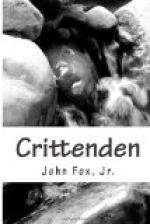The locust-trees were quiet now and the barn was still except for the occasional stamp of a horse in his stall or the squeak of a pig that was pushed out of his warm place by a stronger brother. The night noises were strong and clear—the cricket in the grass, the croaking frogs from the pool, the whir of a night-hawk’s wings along the edge of the yard, the persistent wail of a whip-poor-will sitting lengthwise of a willow limb over the meadow-branch, the occasional sleepy caw of crows from their roost in the woods beyond, the bark of a house-dog at a neighbour’s home across the fields, and, further still, the fine high yell of a fox-hunter and the faint answering yelp of a hound.
And inside, in the mother’s room, the curtain was rising on a tragedy that was tearing open the wounds of that other war—the tragedy upon which a bloody curtain had fallen more than thirty years before. The mother listened quietly, as had her mother before her, while the son spoke quietly, for time and again he had gone over the ground to himself, ending ever with the same unalterable resolve.
There had been a Crittenden in every war of the nation—down to the two Crittendens who slept side by side in the old graveyard below the garden.
And the Crittenden—of whom he had spoken that morning—the gallant Crittenden who led his Kentuckians to death in Cuba, in 1851, was his father’s elder brother. And again he repeated the dying old Confederate’s deathless words with which he had thrilled the Legion that morning—words heard by her own ears as well as his. What else was left him to do—when he knew what those three brothers, if they were alive, would have him do?
And there were other untold reasons, hid in the core of his own heart, faced only when he was alone, and faced again, that night, after he had left his mother and was in his own room and looking out at the moonlight and the big weeping willow that drooped over the one white tomb under which the two brothers, who had been enemies in the battle, slept side by side thus in peace. So far he had followed in their footsteps, since the one part that he was fitted to play was the role they and their ancestors had played beyond the time when the first American among them, failing to rescue his king from Carisbrooke Castle, set sail for Virginia on the very day Charles lost his royal head. But for the Civil War, Crittenden would have played that role worthily and without question to the end. With the close of the war, however, his birthright was gone—even before he was born—and yet, as he grew to manhood, he had gone on in the serene and lofty way of his father—there was nothing else he could do—playing the gentleman still, though with each year the audience grew more restless and the other and lesser actors in the drama of Southern reconstruction more and more resented the particular claims of the star. At last, came with a shock the realization




